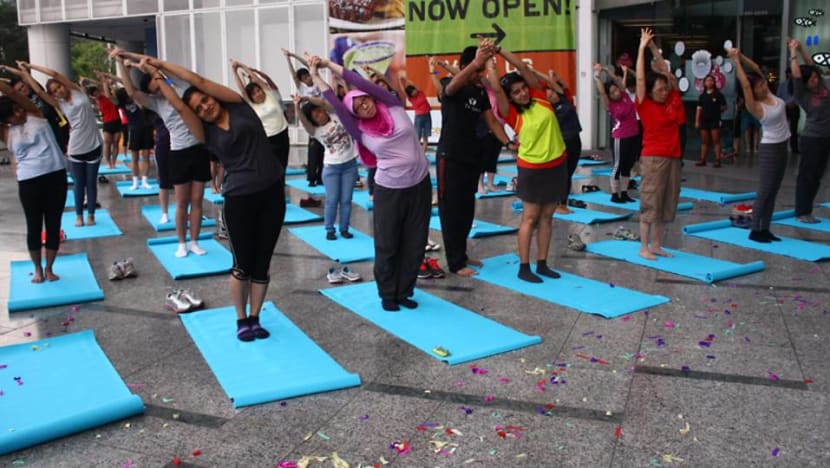commentary Wellness
Commentary: Let's exercise ownership over our health, not wait for illness to set in
Chronic diseases in Singapore are on the rise, but there's actions Singaporeans can easily take today to have a healthier heart, says one observer.

(Photo: Unsplash/Bruno Nascimento)
SINGAPORE: It has arguably never been easier to choose healthy options.
We know what we should be eating, drinking and doing to keep fit, and the food and sports industries have responded with a raft of new products for every taste from reduced fat muffins to hundreds of calorie-burning classes for every interest and ability level.
Even the fast food industry has jumped on the bandwagon.
Yet chronic diseases are still on the rise in Singapore.
In just one generation, Asia has gone from having one of the lowest rates of heart disease in the world, to one of the highest.
And this trend is showing no signs of abating. According to the World Bank, half of all global cases of heart disease will be concentrated in Asia by 2030.
And it’s not just heart disease that’s on the rise. There are countless other statistics that all make for equally grim reading about a host of other chronic conditions too.
This should be enough to shock us into action but the Philips Future Health Index (FHI) suggests that we’re still not taking this seriously enough.
While the Government and the private sector have their roles to play in tackling this problem, individuals must take more responsibility for their own health too.
Although most chronic conditions can be prevented through lifestyle changes, it seems that lack of education – for both healthcare providers and patients – is one of the biggest barriers.

BRAVE NEW WORLD
With recent innovations in consumer technology, we are on the cusp of a brave new world where everyday appliances can not only encourage healthier habits, but can also collect relevant data to provide an early warning signal about the onset of illnesses.
Examples include smartphone-based glucose monitors for diabetics, to the potential in the near future for smart toothbrushes that can be used to detect an oncoming cold by spotting changes in saliva.
However, all of this data is only beneficial if patients know how to interpret and apply it.
But the FHI findings show that Singapore isn’t quite there yet.
We spoke to more than 33,000 people and healthcare professionals across the world and found that, although the majority of Singaporeans recognise the benefits of connected care technology, as many as 35 per cent of those already using it do not understand how to interpret the results.
This mirrors an international challenge that many other developed nations are grappling with. At a time when shopping, banking and even dating online are commonplace, it seems people have generally been slower to embrace digitalisation in healthcare.
Public education campaigns and training, particularly for higher-risk groups like the elderly, can go some way towards addressing this.
Health and consumer technology organisations also have an important role to play in designing healthcare technologies to be more affordable and accessible to a wider audience beyond early adopters, while the Government can encourage innovation in this field through subsidies, business incentives and incubator schemes.
However, none of this will make a difference unless individuals change their own attitudes towards healthcare.

ILLNESS AS TREATMENT
We are accustomed to thinking about healthcare as treating an illness - you wait until you’re unwell before going to the doctor and then popping a pill until you feel better.
Many people are also in denial, thinking that serious medical conditions will never happen to them.
For Singapore to beat chronic diseases, this attitude will need to fundamentally change. While this won’t happen overnight, we urgently need to move towards a healthcare system – and society - that prioritises prevention over cure.
The Ministry of Health’s latest announcement that it will become compulsory for all healthcare providers to upload data to the National Electronic Health Record is a huge step in the right direction. Particularly as our research finds that as many as 25 per cent of Singaporeans don’t feel that they have any ownership of their own medical records.
However, individuals ultimately need to take on more personal responsibility for monitoring, managing and maintaining their own health than they currently are. And this needs to happen at every life stage, rather than being kick-started by the onset of illness.
Given the technology that we have readily available today, not to mention the innovations that are set to become mainstream in the near future, there is no reason why healthcare shouldn’t become part of our daily lives.
Cardiovascular diseases, and other lifestyle-related chronic conditions, are claiming far too many lives.
It’s time for us to be a much smarter nation when it comes to healthcare, and to use the technology that we have at our disposal to tackle this killer problem.
Ivy Lai is country manager at Philips Singapore.














